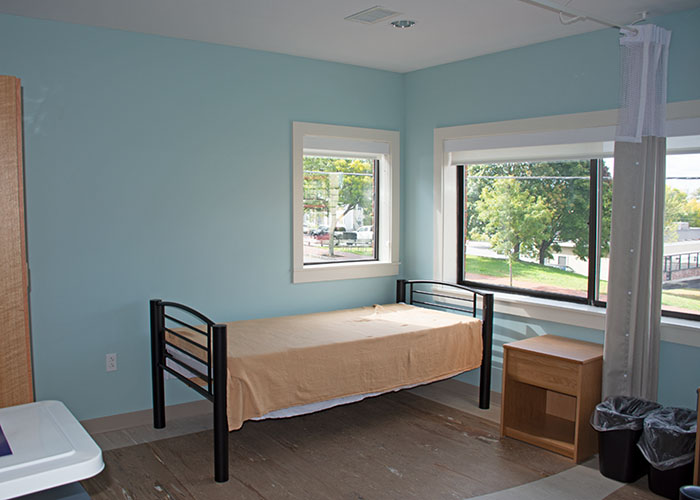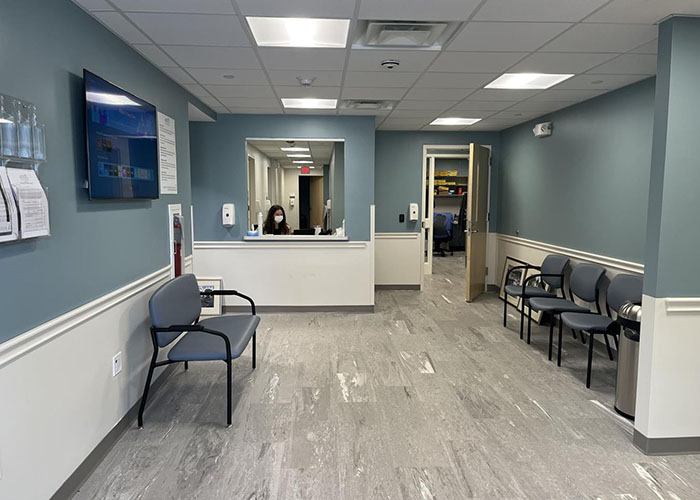People who have unstable housing or experience homelessness after hospitalization have 30 percent more visits to the ER after discharge than people with stable housing, a situation that creates major challenges in a patient’s recovery. To tackle the problem, Maine Medical Center (MMC), Greater Portland Health (GPH), a federally qualified health center, and Preble Street have partnered to establish a recuperative care program (RCP) for supporting patients discharged with unstable housing. The RCP offers a special model of care for people who no longer need hospital services, but do need a safe, stable place to fully recover from their hospital stay.
The program, located at 934 Congress Street in Portland and opened in September 2022, is a short-term space that allows homeless clients an opportunity to rest and heal in a safe, supportive environment, rather than alone on the streets or in a shelter where recovery can be difficult. 934 Congress Street has 15 beds with a common room and bathrooms — similar to a school dorm — and 24/7 staffing. The program is run by Greater Portland Health. In addition to providing recuperative care, GPH connects clients with community resources, so they are better positioned to succeed once they leave the facility.
The idea for a recuperative care facility first came about in 2012 when members of MMC’s Long Stay Intervention Workgroup researched the idea. They visited established RCPs and started tracking MMC patient data for potential length-of-stay reduction. This led to a trial of smaller iterations of the concept in Portland, which had promising results. In 2016, a select group of employees attended an Advisory Board Fellowship in Washington, D.C., an opportunity sponsored by the hospital for participants to build executive leadership skills and work together on a specific challenge. They chose the challenge of safe discharges for vulnerable patients as their capstone project, building upon the Workgroup’s efforts and partnering with Greater Portland Health and Preble Street. The three organizations came together to provide the space, staffing, resources and funding that keep the RCP operational.
The recuperative care model is the first in Maine and has shown great success. In its first six months the RCP supported 44 clients. The average length of stay at the center is 21 days, and use of the center has reduced 950 “bed days” at MMC, freeing up space for patients that need hospital care. Patients discharged to a recuperative care facility have fewer ER visits and inpatient stays, have reduced gaps in care and are more likely to use appropriate outpatient services. This is true for the clients at 934 Congress Street. One former client says they were able to finish their antibiotic treatment “all the way for the first time.” Another client says they’ve “accomplished sobriety for six weeks,” were accepted at a sober living house, cleared of infection and are now walking without a walker.

One of the 15 bedrooms at the Recuperative Care Program at 934 Congress Street, Portland.

The waiting room at the Recuperative Care Program.
“The reality of opening 934 Congress Street took years in the making and has been built on the vision, advocacy and collaborative spirit of many community leaders. The care team is extraordinary and exemplary. The RCP now thrives because of many professionals who generously dedicate themselves to providing the very best wrap-around care and outcomes to the patients and clients we serve.”
– Kathryn Cope, COO, Southern Maine Health Care
Next Steps
The RCP partnership hopes to continue the success of the center and expand its services. MMC currently provides most of the financial support to the the RCP through a community benefit agreement, but the hospital is looking for other sources of funding, such as MaineCare. The center is scalable to other health systems and hospitals, and the team is presenting their successes nationally and globally.
Collaborators
- Kathryn Cope, COO, Southern Maine Health Care (former VP Operations, Maine Medical Center)
- Lou Inzana, CFO Maine Medical Center & Associate CFO MaineHealth
- Christopher Wellins MD, MS, FACP, Senior Medical Director of Utilization Management, Maine Medical Center, Portland, Maine
- Renee Fay-LeBlanc MD, FACP, Chief Medical Officer, Greater Portland Health, Portland, Maine
- Daniella Cameron, MSW, Deputy Director, Preble Street
- Courtney Pladsen, DNP, FNP, RN Greater Portland Health and National Healthcare for the Homeless Council
- Ann Tucker, CEO, Greater Portland Health
- Mark Swann, MSPA, Executive Director, Preble Street
Our Purpose
MaineHealth Innovation builds connections to drive diversity of thought, educates to produce creative problem-solvers and funds to accelerate ideas. By leveraging the ideas, insights and expertise of all care team members to develop novel solutions to our unmet care needs, we are working together so our communities are the healthiest in America.
